Images obtained by AyiboPost demonstrate the rapid progress of a construction project in Village de Dieu, while the Viv Ansanm coalition, which includes Izo, sets fire to citizens’ homes and destroys infrastructure in the lower part of Port-au-Prince city
Stanley was sure of one thing: the areas near the National Penitentiary were still habitable, thanks to the increased protection around Haiti’s largest prison.
But when – attacked by bandits on March 2 – the armored vehicles guarding the centre fled at around 6 p.m., the translator knew he was running out of time… if he wanted to survive.
Amid the roar of detonations, Stanley, his companion and dozens of neighbors rushed to the Champ de Mars, seeking refuge.
When he returned to assess the damage four days later, almost all of the houses around his apartment on Rue du Centre had been burned down.
His small cold drinks shop, ransacked. « The only thing I was able to save was my ID, » the 39-year-old told AyiboPost.
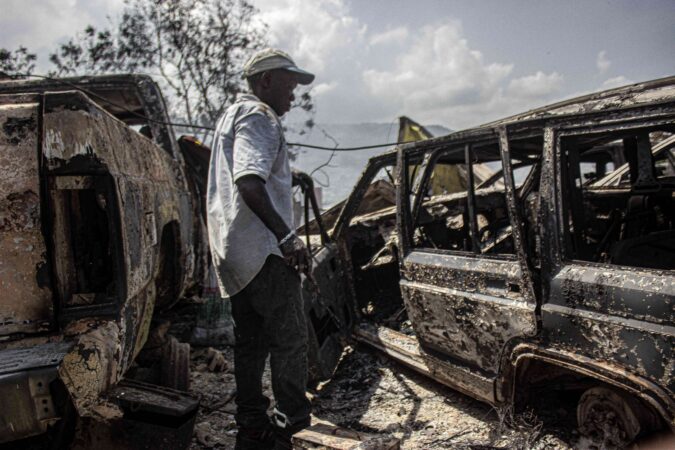
On March 25, 2024, a mechanic tries to salvage parts from vehicles set ablaze by bandits the previous day.
Two days prior to the historic escape, Jimmy « Barbecue » Chérizier publicly called for a « revolution » to « liberate the country » from Ariel Henry’s government, as well as from « corrupt politicians and businessmen. »
The coalition of revolutionaries, strangely named « Viv Ansanm, » counts amongst its members, Johnson « Izo » André – alongside other crime lords – whose gang based not far from the Penitentiary, has terrorized Port-au-Prince for years.
Read also: Exclusive | What really happened at the Haitian National Penitentiary?
Kidnappings, rapes, murders, extortion at the southern entrance to the capital – the Village de Dieu gang is probably, according to specialists, the richest and most well-armed in the country.
Its members regularly target areas close to the penitentiary, but the unprecedented attack on the prison in early March triggered a wave of violence against the nearby population.
Nearly 86,000 people – including thousands of residents in the lower part of Port-au-Prince – have fled their homes, according to the International Organization for Migration (IOM).
About one kilometer from the epicenter of the violence, unflappable workers continue their work in a large multi-story building in Village de Dieu, according to images obtained between March 12 and April 1, 2024 by AyiboPost.
Patiently, workers install bright green lawns, at least one air conditioning system and glass windows, near a swimming pool at the bottom of which is simply engraved the name: « Izo ».
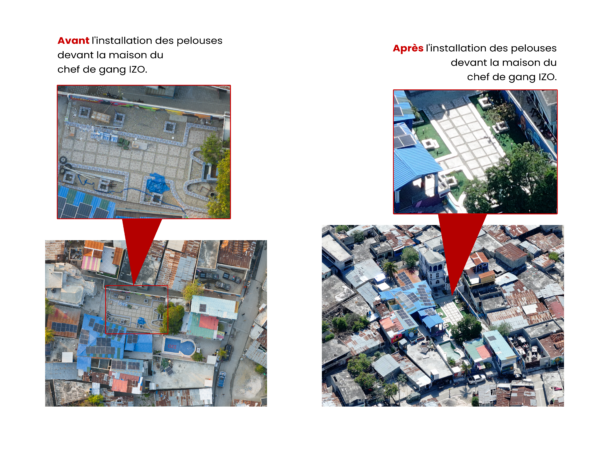
The gang leader does not hide his taste for luxury. In videos posted on TikTok, Instagram and YouTube, he calls his opponents « scumbags, » and regularly shows off his collection of weapons and tactical gear, as well as a festive lifestyle where money, alcohol and sex flow freely.
« Kidnapping is not enough to cover so many expenses, » a source familiar with the gang’s operations told AyiboPost.
In a 2024 report by the United Nations, suspicions were raised regarding the connection of the « Viv Ansanm » coalition with a scheme aimed at facilitating drug and arms trafficking in Haiti.
When the creation of the supergang was first announced in September 2023, a large shipment of cocaine was to transit through Haiti.
According to the report, Izo was responsible for protecting the goods.
There are suspicions the drugs were intercepted between Hinche and Maïssade.
This, according to the source, led to an inter-gang conflict, which left around 30 people dead and hundreds displaced between September 22 and September 25, 2023.
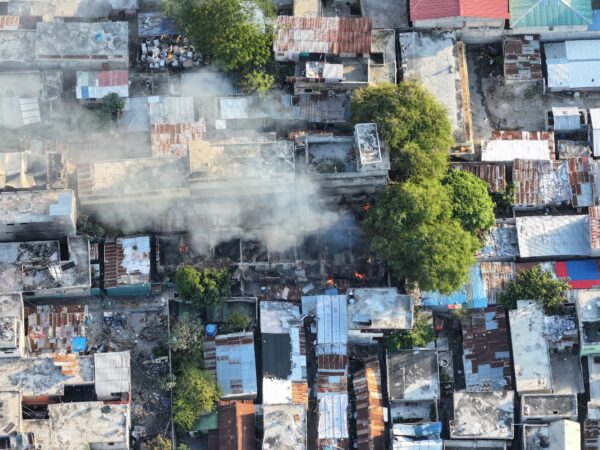
The gangs set fire to houses in the lower part of the city of Port-au-Prince.
Since then, no one heard of « Viv Ansanm »… until the end of February 2024.
« Boats shuttle at night between Village de Dieu and Lafito, » according to the source familiar with the Izo gang’s activities.
For the latter, the new « Viv Ansanm » assembly would be just another fragile arrangement « to profit from the crisis, » by exploiting « transnational alliances » with traffickers in the region.
And in this configuration, « Vilaj and Ti Lapli », another gang leader, gets the biggest slice of the pie.
In mid-March, footage posted online by the gang showed armed men wearing hoods, uniforms and tactical equipment.
« The training and arming displayed by different members of the gang, especially from the Village de Dieu Unit, as well as Izo’s financial capabilities, place it on a different level than other criminal groups, including in its greater financial autonomy, » according to Romain Le-Cour-Grandmaison, who conducts research on Haiti for the Geneva-based Global Initiative Against Transnational Crime.
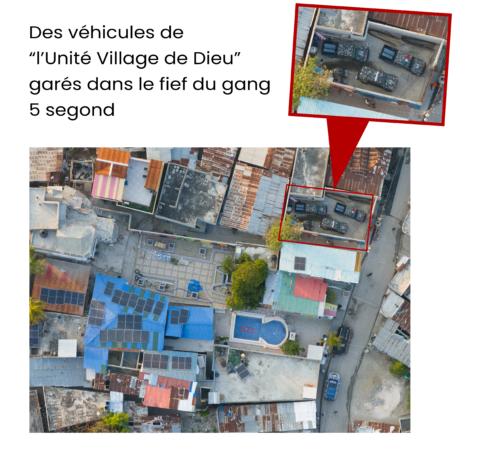
In the weeks after the attack on the prison, the bandits set up a toll booth right in front of Rita Favéus’ home on Rue de l’Enterrement in the lower part of the city.
The woman lost her sight at the end of 2022. But she kept her ears open, knowing that it was only a matter of time before the men of « Vilaj » came knocking on her door.
« They set fire to a neighbor’s house, then they searched our house, stealing everything of value in the process, » Favéus told AyiboPost.
The woman, her husband (a car washer), a baby and three children ran away.
The gangs then set a fire.
« Bed, TV, fan… Even my birth certificate is burned, » says Favéus, who has since been at the Caroline Chauveau National School, which has been transformed into a temporary shelter in the Champ de Mars area. More than 2,300 people have taken refuge there.
In recent decades, the criminalization of Haiti – the most unequal in the Caribbean – has been carried out with the help of political leaders and members of the country’s economic sector.
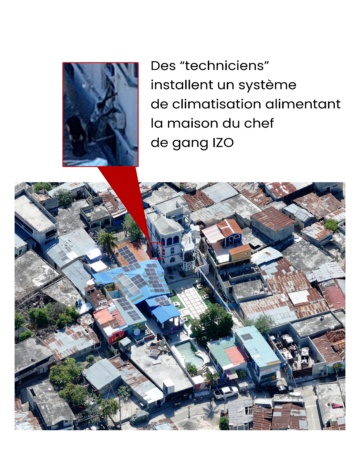
Today, most gangs are self-reliant, according to experts.
Since 2022, Canada has imposed sanctions on 28 members of Haiti’s elite for corruption and nefarious gang ties.
The list includes former president Michel Joseph Martelly, his prime minister Laurent Lamothe and powerful businessmen such as Reynold Deeb of the Deka Group, Gilbert Bigio of GB Group or the insurer, Sherif Abdallah.
According to the United Nations, Michel Martelly – who ascended to the presidency with US support – used « gangs [during his tenure] to expand his influence over neighborhoods to advance his political agenda, contributing to a legacy of insecurity whose impacts are still felt today. »
At less than 30 years of age, Johnson « Izo » André is part of the last generation of gang leaders in the country. Few unarmed civilians live in the territory controlled by his group, unlike some other high-profile criminals.
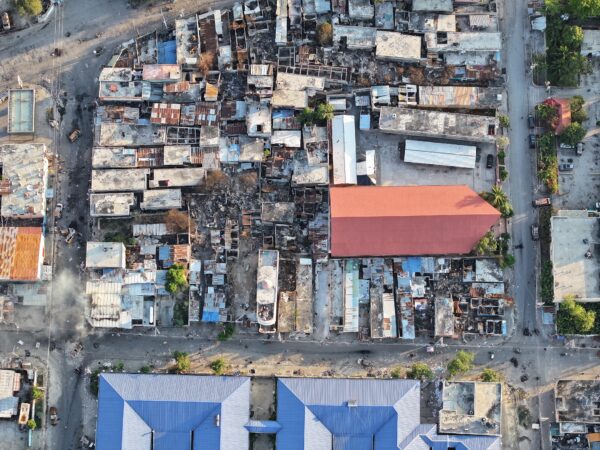
The gangs set fire to houses and vehicles in the lower part of the city of Port-au-Prince.
His influence is no less, however. « In some poor neighborhoods, Izo becomes the aspiration, and that’s part of the problem, » a security expert in Haiti told AyiboPost.
The gang leader, an aspiring rapper, appears on the internet in overproduced videos that have sometimes been viewed millions of times. « The voyeurism of some international media contributes to the glorification of these gangs, helping them to recruit, » said the specialist, who requested anonymity for security reasons.
Bèbè was still at work in Delmas when she learned that her house was on fire near the Sylvio Cator Stadium on the afternoon of March 29.
The family member who was still in the house was able to escape. But the latter was ambushed by gangs: « They searched everyone, » the woman testifies.
In the days following these devastating attacks, most of the occupants of unburned homes tried to return to the Rue de la Réunion. Then, the gangs returned and burned everything, according to several witnesses.
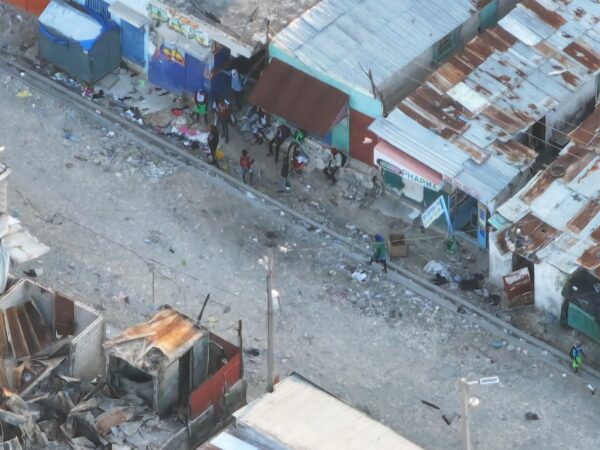
Armed gang members at the lower part of the city.
A question plagues Bèbè’s mind.
« How can they say they are fighting for the poor, when they are using their guns to kick us out of our homes? » she asked.
The spokesman for the « revolution », Jimmy Chérizier, also raises questions of his own about the population’s mistrust.
After the burning of thousands of homes and the forced displacement of tens of thousands of citizens, Barbecue broadcasted a video via WhatsApp from April 10 to criticize the people who, according to him, « do not recognize those who fight for them. »
To the poor, the leader of the « Viv Ansanm » coalition warns that « If you see us in the streets, get moving, » he said, declaring that the deaths to come will be the fault of politicians.
ByWidlore Mérancourt and Wethzer Piercin
Cover image edited by AyiboPost featuring powerful gang leaders of the « Viv Ansanm » coalition. | © Riquemi Perez
This piece was updated. 21.06 15.04.2024
Stay in touch with AyiboPost through :
► Our WhatsApp channel : click here
► Our WhatsApp Community : click here
► Our Telegram canal : click here







Comments